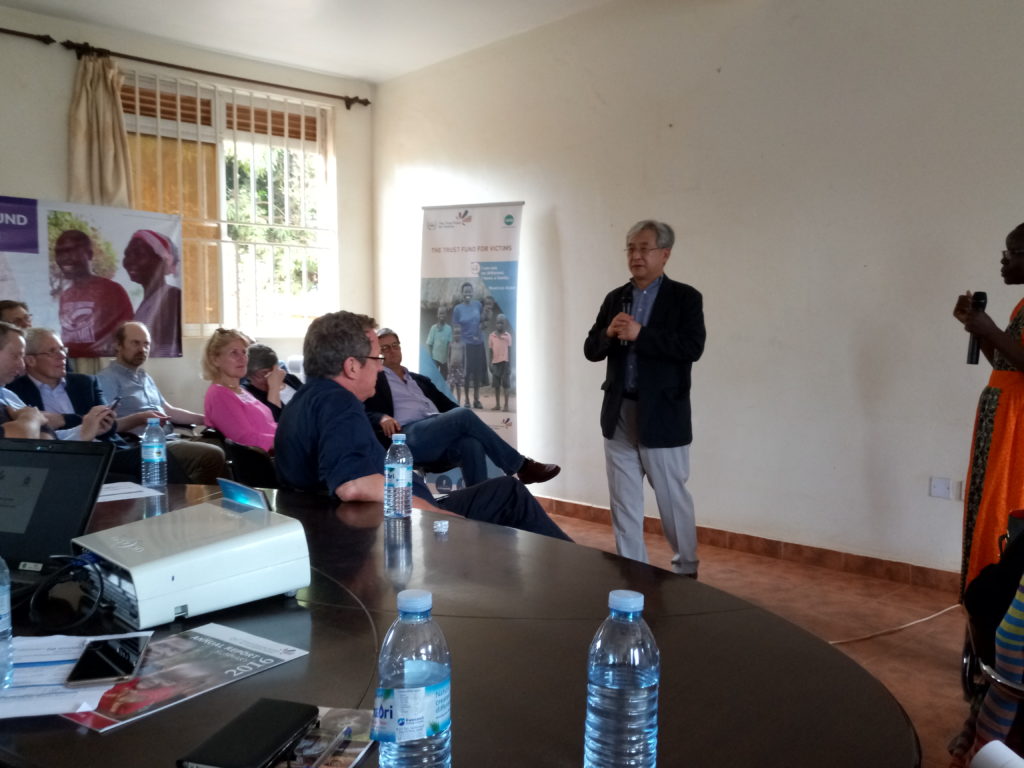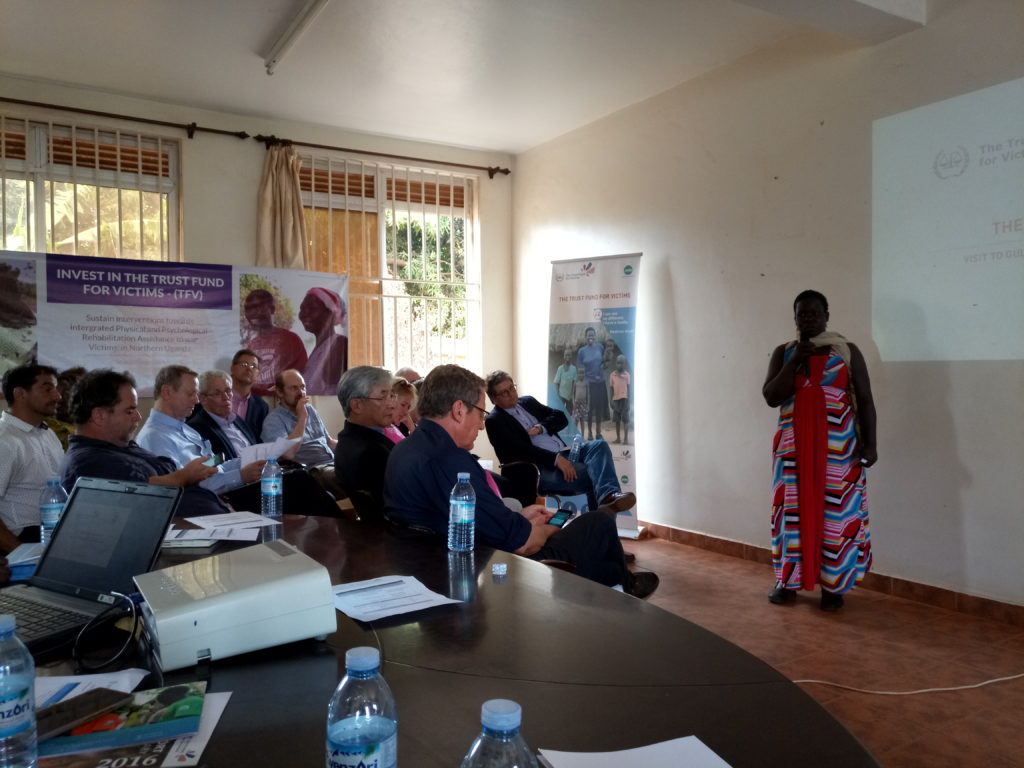Last month, the government of Ireland in partnership with the Trust Fund for Victims (TFV) at the International Criminal Court’s (ICC) led a delegation of States Parties representatives to northern Uganda and interacted with conflict survivors and conflict affected communities. This is significant because as Dominic Ongwen’s trial continues at the ICC, a key factor that continues to generate debate is the mental, physical, and psychosocial rehabilitation of conflict survivors.
According to a press release [pdf] by the TFV, the visit was initiated by the government of Ireland and was aimed at monitoring and “reviewing implementation of TFV projects in northern Uganda, meeting with victims and survivors and affected communities who have been receiving support from the TFV.” The visit was in commemoration of the 20th anniversary of the Rome Statute.
Ongwen, a former commander of the Lord’s Resistance Army (LRA) has been on trial since December 6, 2016. He is charged with 70 counts of war crimes and crimes against humanity allegedly committed in the former Internally Displaced Persons (IDP) camps of Lukodi, Abok, Pajule, and Odek. However, the ICC has had an ongoing investigation in northern Uganda since 2004.
The TFV has been active in northern Uganda since 2008, and its programs benefit victims beyond those who are formally participating in the Ongwen trial. As part of its mandate, the TFV provides physical and psychological rehabilitation or material support to victims that fall within the jurisdiction of the ICC. Rehabilitation programs are particularly crucial for post-conflict recovery of victims in northern Uganda because the widespread and horrendous acts of torture and mutilation that were inflicted upon the civilian population by the LRA. Accused of supporting government soldiers, many community members in northern Uganda were subjected to beatings and mutilation of body parts that left them with disabilities and health complications that continued to persist long after the end of the conflict. Other victims suffered injuries or became disabled as a result of landmines and other unexploded ordinances.

President of the Assembly of States Parties , Judge O-Gon Kwon, speaking at Gulu Regional Referral Hospital
The delegation was led by the president of the Assembly of States Parties of the ICC, Judge O-Gon Kwon; the TFV Executive Director, Pieter de Baan; and the Irish Ambassador to The Hague, Kevin Kelly. Ten state parties participated in the visit, including the representatives from the governments of Canada, Chile, Denmark, Ireland, Finland, Netherlands, Norway, Sweden, Uganda, United Kingdom, and the European Union. During their visit, they interacted with Ugandan government officials, civil society representatives, and beneficiaries of the TFV program.
On February 20, the delegates visited Gulu Regional Referral Hospital, located in Gulu Town, where they interacted with beneficiaries of the TFV and representatives of four civil society organizations implementing TFV programs. On the morning of February 21, the delegates traveled to Awach sub-county, where they met with community members who have been receiving support from the TFV. In the afternoon of the same day, the delegates visited Lira district and met with more beneficiaries of the TFV.
Over the course of these visits, the delegates had the opportunity to hear from the victims themselves about how they have benefitted from the TFV programs.
Irene, a victim and survivor who lost a limb during the conflict in northern Uganda said, “We are happy with the support that the TFV is giving. When I lost my limb, I thought that life was over. There was no hope. But through the [TFV] program I got an artificial limb, and it changed my life.”
Monica, another conflict survivor said, “I was injured in 2003, became disabled, and lost hope. I thought that was the end of my life. Even my own people rejected me. Relatives and partners abandoned many people who were injured during the war. The injuries left us traumatized, and we felt like ending our lives. Replacement of our limbs enabled us to regain dignity and walk with our heads held high.”
Steven, a landmine injury survivor who received an artificial limb with support from the TFV also had good words to say about the rehabilitation program. “The TFV has significantly impacted on our lives. We have regained self-confidence and prestige.”
In addition to the individual benefits that accrued from the rehabilitation services that they received, many beneficiaries also noted that the TFV programs had been of secondary benefits to their relatives and other community members. The most frequently mentioned benefit was the reduction of the burden upon the beneficiaries’ caregivers.
“Our children would look at us as a burden especially when we would frequently ask them for support,” said Tabu, a beneficiary. “However after receiving rehabilitation, our children are now happy that we can support them.”
Vicky, another landmine survivor said, “When we had no limbs, we were isolated from relatives who looked at us as a burden. Now we are self-reliant, and we have our income generating activities so we are not dependent on anyone. Our relatives love and value us again.”
“In the community we are currently perceived and treated as normal people. It has restored respect in our homes,” added Monica.
In addition to mental and physical rehabilitation, the TFV program has also focused on provision of livelihood support and economic empowerment programs that have empowered the beneficiaries to earn a living. As Pamela Angwech, the director of Gulu Women’s Economic Development and Globalization (GWED-G), a civil society organization working predominantly with female survivors of conflict, revealed: “Material support from the TFV was able to equip the victims with economic empowerment skills. It was able to strengthen them economically and make them self-employed.”
Based on the above successes, many victims called upon the TFV to continue its support. The rehabilitation program, however, faces logistical and funding challenges.
One of the challenges is the sustainability aspect of the program. “Our fear is that if the TFV closes then we shall not be able to afford the rehabilitation services,” said Monica.
The other challenge relates to the large numbers of victims that still need to be reached all over northern Uganda. “The geographical scope of the project is too wide, and this puts a strain on the equipment and logistics,” the director of Gulu Regional Referral Hospital noted. “While the war has ended, we are still dealing with trauma, which is still present in the community.”
John Makoha, the director of AVSI, a civil society organization that runs a TFV funded rehabilitation program noted that, “The rehabilitation program is still faced with a number of challenges. We still receive over 400 people annually who need our services.”
Another challenge is the difficulty in rehabilitating victims of sexual and gender based violence (SGBV). “Female war victims have aspects of SGBV that have affected them because they experienced sexual abuse. Women who were sexually abused say the war was fought in heir bodies, and this continues to traumatize them.”
For many of the delegates, it was the first time they were interacting with victims face-to-face. They were deeply moved by the testimonies they had heard and pledged to provide more support for victims of the conflict.
O-Gon Kwon, the President of the ICC Assembly of State Parties, was among the delegates who was moved by the victims’ testimonies while meeting with them in northern Uganda. “This is the first time ever in my life to communicate with victims despite having been a judge for a nearly 40 years,” Kwon revealed. “State parties should ensure that perpetrators of crimes under jurisdiction of the ICC are brought to book,” he added.
Mirjam Blaak, the Ugandan Ambassador to Netherlands, encouraged the victims to remain strong. “Thank you for the courage and years of endurance despite years of suffering,” she said while addressing victims in Gulu.
Mama Koite Doumbia, the African states’ representative to the TFV Board of Directors, noted that, “The delegation’s visit is a commitment to assist people in Uganda. It is better to see once, than to hear a thousand times. What we have seen and heard today gives us hope and pride. We shall continue being spokespersons for victims to the world.”
Peace building and conflict practitioners often advise the implementation of short-term, medium, and long-term reparations schemes for ensuring the recovery and rehabilitation of conflict survivors. Given the above achievements, it is clear that the TFV has been instrumental in providing interim support for victims, despite the ongoing quest for justice at the ICC.
Lino Owor Ogora is a peace-building practitioner who has worked with victims of conflict in northern Uganda and South Sudan since 2006. He is also the Co-Founder of the Foundation for Justice and Development Initiatives (FJDI), a local Non-Government Organization based in Gulu District that works with children, youth, women and communities to promote justice, development and economic recovery in northern Uganda.

